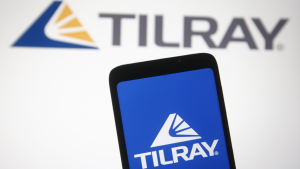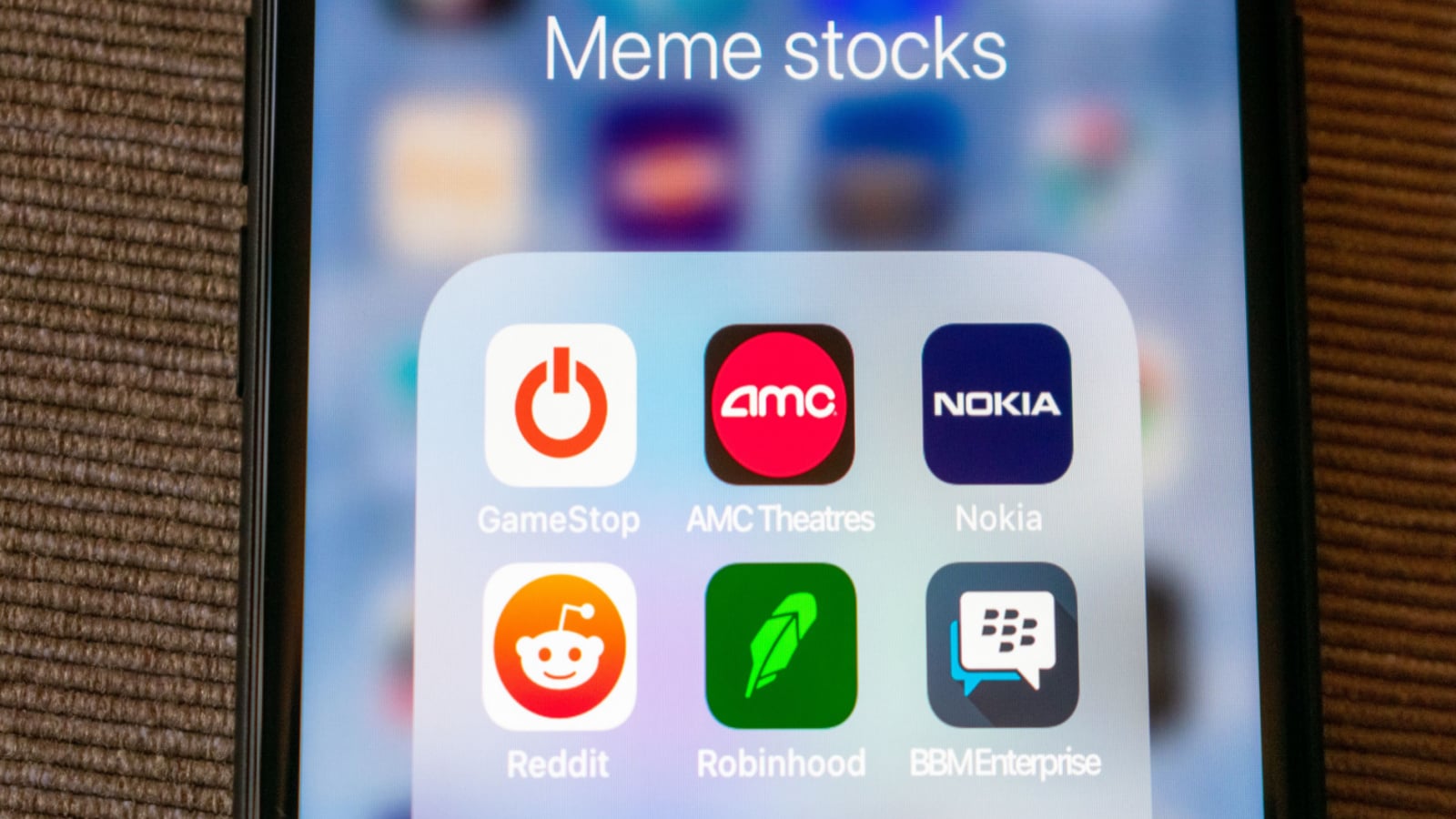Discovering which meme stocks to avoid can be tricky.
These stocks have, for better or worse, become part of the general discussion of the stock market and investments overall.
The relatively new class of stocks took off during the pandemic as stimulus checks hit accounts and quarantined youthful investors succumbed to overzealousness.
That isn’t to say that a lot of them didn’t make a lot of money. Many did. Nor is it to say that they didn’t have a worthwhile cause in loosening Wall Street’s grip over the markets.
However, we’ve entered a new era. Stimulus checks are a thing of the past. Their effects, however, very much continue to be felt. Interest rates are much higher to combat their effects.
That means that capital is more expensive and there are meme stocks to avoid that might not even have been on your radar.
GameStop (GME)

GameStop (NYSE:GME) has become synonymous with meme stocks and the overall movement.
That has prompted lots of capital into the firm. However GameStop’s emergence was predicated on a premise that simply never held water which is why it’s one of the primary meme stocks to avoid.
Ryan Cohen, the activist investor who propelled GameStop into the spotlight and recently was named CEO of the firm, got it wrong from the get-go.
Cohen’s intuition was correct: GameStop needed to get with the times and quickly adapt to the digitization of the gaming industry. That isn’t where things went wrong. It’s simply that Cohen was too late in galvanizing his fans to get behind the firm.
GameStop invested heavily into growth and digitization, but none of it bore the fruit expected. Some efforts including NFTs and E-commerce have simply missed the mark entirely.
Unfortunately, GameStop is deep into a period in which growth has taken a backseat to the realities of the current market.
Cost containment is the goal of the day and that means GameStop has become a boring company in the place of a pioneer that sought exciting growth above all else.
Tilray (TLRY)

Tilray (NASDAQ:TLRY) stock continues to garner a lot of attention on the back of the presumed rescheduling of cannabis from a Schedule I controlled substance to Schedule III.
That change has many investors speculating that Tilray, as one of the well-known names in the space, will soon break out. I sincerely doubt that will be the case. In fact, I think it’s one of the meme stocks to avoid in the cannabis space.
Tilray has already shown investors that its belief in the cannabis business model was broken when it bought Sweetwater Brewing in 2022. Prior to that, Tilray had merged with Aphria to become the biggest cannabis company in the world.
When that didn’t work and share prices steadily crept lower, Tilray decided to pivot again. It’s now an alcohol/cannabis firm and one that has consistently produced massive losses no matter who it buys or what business it enters.
Tilray reported just under $190 million in revenues in the second quarter leading to a $1.443 billion net loss. If you want to invest in alcohol find a good firm in that space. If you want to invest in a good weed firm, do the same. If you want to invest neither, buy TLRY.
AMC (AMC)

AMC (NYSE:AMC) has shown flickers of a resurgence that could trick investors into buying what is, on par, a bad stock overall.
By flickers of resurgence, I mean second-quarter results that superficially looked impressive.
Revenues increased from $1.16 billion to $1.35 billion and a $121.6 million loss transformed into an $8.6 million gain. However, as positive as those figures are, AMC’s realities are much more negative overall.
The company is deeply indebted to the tune of $9 billion. By comparison, its liquidity reserves of $643 million suddenly become woefully meager.
AMC sold preferred equity that it converted to common equity in order to address that debt. The choice to do so introduces dilution risk. It’s abundantly clear that investors are abandoning ship as those greater truths become more evident.
Despite the $8.6 million gain in Q2, the company is expected to lose several hundred million this year. What makes this one of the meme stocks to avoid is the decline that many have expected will continue.
ContextLogic (WISH)

ContextLogic (NASDAQ:WISH) is an inexpensive e-commerce platform known for knockoffs and other inferior products.
It is proving that you can only sell junk for so long before it catches up to you.
All a reasonable investor needs to do in order to avoid falling for WISH shares is to read its most recent earnings report. The figures were bad and the decline in expectations was even worse.
Revenues fell by 42% in the second quarter, declining to $78 million. That was far below the $94 million analysts had been expecting. It led to an $80 million loss. That was better than the $90 million loss it posted a year earlier, but certainly nothing to celebrate.
The bigger concern is that ContextLogic is declining rapidly. Q3 revenue guidance had been pegged at more than $100 million. Following earnings, it has now been revised downward to a range between $55 to $65 million. It’s a great platform on which to buy gag gifts that were never intended as such, but a terrible place to invest your capital.
Beachbody (BODY)

Beachbody (NYSE:BODY) is a company that was resurrected from its former ashes during the pandemic quarantines that shut down gyms.
Forced inside, fitness enthusiasts sought digital solutions. The resounding success of Peloton (NASDAQ:PTON) paved the way for Beachbody to take its shot.
The firm leveraged the success of products like 8-minute abs and P90X and IPO’d in 2021. That IPO looked like it might be successful for all of a week or so, plateaued, and has lost value ever since. Shares have gone from $10 to $0.30.
Revenues continued to fall rapidly. The lone bright spot is the fact that net losses improved by 39%. However, they’re still substantial at $25.7 million. Beachbody’s liquidity was a bit more than $58 million to end Q2. Quick math suggests that the company cannot continue to hang on for very much longer.
Further, Beachbody has faced serious troubles before and operated as an MLM for which it was fined. Its recent rebrand to BODi means absolutely nothing and it is still a firm to avoid at all costs.
Robinhood (HOOD)

I’m uncertain whether Robinhood (NASDAQ:HOOD) stock is headed for an imminent crash, but, I believe it is headed down.
If you’ll remember, Robinhood emerged during the pandemic as an alternative trading platform with reduced fees. It took off and gained a lot of traction in the lead-up to its IPO in mid-2021.
The IPO was manic, doubling, and then halving in the period of a few days. It has gone down, down, down since but benefitting from a bit of growth in 2023.
Robinhood’s user base has shrunk, and the platform caters to skilled traders and is no frills. However, Robinhood posted a surprise profit in Q2 that prompted a spike in share prices.
The firm went from relying on spread fees to relying on interest-bearing accounts. It’s difficult to understand where it’s going.
That makes it difficult for investors to get behind the firm. Further, it’s very possible that the SEC will launch an attack against Robinhood in the future. It’s just too risky.
IronNet (IRNT)

IronNet (OTCMKTS:IRNT) is a stock headed for an imminent crash. I doubt many readers are seriously considering investing in it at this point anyhow, but those who are, please don’t.
Shares went from $0.22 to $0.03 between July and early September. A few days later, they’re trading at $0.0075.
There’s a genuine chance that the value of your capital will decline drastically by establishing a contrarian position. The company announced its intent to delist from the New York Stock Exchange back in July.
That was a clear sign that the former meme darling was on its way down. More recently, the company announced plans to cut its workforce and operations while hinting at bankruptcy as a reorganization strategy.
It is almost certainly headed to zero in the very immediate future. It is operating with a very minimal staff but who knows how long that will continue.
If it doesn’t receive funding it’ll shut down any day. If it does, it’s only valuable for risk-tolerant traders willing to lose money.
On the date of publication, Alex Sirois did not have (either directly or indirectly) any positions in the securities mentioned in this article. The opinions expressed in this article are those of the writer, subject to the InvestorPlace.com Publishing Guidelines.
Healthcare, Cannabis, Consumer Discretionary, Technology, Cybersecurity, E-Commerce, Financial, Fintech, Communications, Media, Retail
